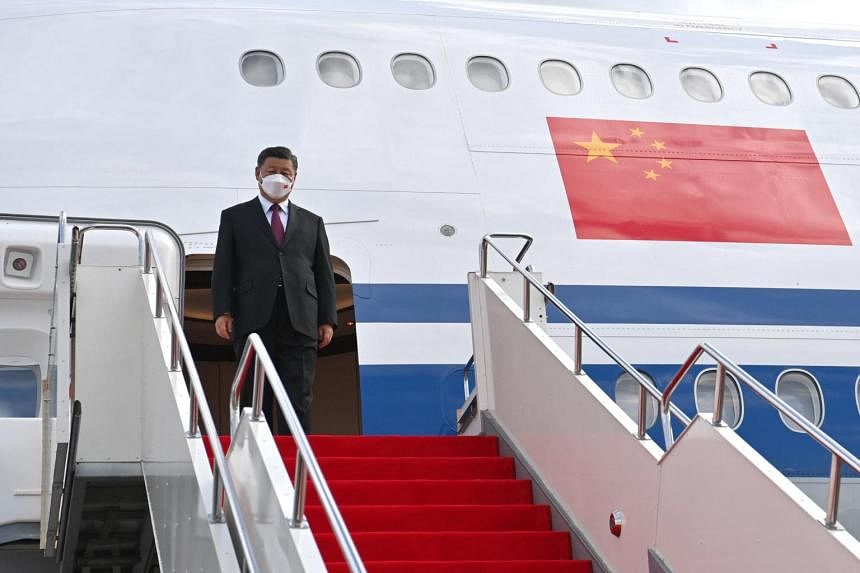BEIJING – Chinese President Xi Jinping kicked off his first international visit in more than two years on Wednesday with a three-day trip to Central Asia, where he will attend the summit of a Beijing-led multilateral bloc and meet his Russian counterpart Vladimir Putin.
It will be the first face-to-face meeting between the two leaders since Russia’s invasion of Ukraine in February.
The meeting also comes at a time when Russia is facing setbacks on the battlefield, and experts will be closely watching for any foreign policy signals, especially since Beijing declared a “no limits” partnership with Moscow earlier this year.
Arriving in Kazakhstan by chartered plane on Wednesday, Mr Xi was greeted by Kazakh officials, including his counterpart President Kassym-Jomart Tokayev.
The Chinese leader will meet Mr Putin on Thursday in Samarkand, Uzbekistan, on the sidelines of the leaders’ summit of the Shanghai Cooperation Organisation (SCO).
The SCO is an eight-member economic and security bloc that China sees as a counter to Western alliances. It comprises China, Russia, India, Pakistan and the Central Asian nations of Kazakhstan, Kyrgyzstan, Tajikistan and Uzbekistan.
That the SCO summit will be part of Mr Xi’s first foreign visit since around the start of the pandemic indicates his desire to boost China’s cooperation and links with the SCO’s member nations, said experts.
“China wants to take some actions to counter American strategic pressure,” said Professor Zhu Feng, dean of the Institute of International Relations at Nanjing University.
But this is also where Mr Xi has to maintain a “tricky” balance, he added.
“Russia has become an object of condemnation by the international community and it has suffered setbacks in the war. Further strengthening China-Russia strategic coordination is not in China’s interests,” he said.
Russia’s forces have in recent days suffered one of their worst setbacks since the war started, after Ukrainian forces mounted a lightning counter-offensive to take back around 8,000 sq km of lost terrain.
Beijing has refrained from criticising Russia’s invasion of its neighbour from the start, instead panning the economic sanctions that Western nations have imposed on Moscow.
And while it has not provided military support to Moscow, Beijing has stepped up Russian energy imports.
Questions have been raised about whether Beijing would support Moscow further, with the two leaders due to meet.
During a visit to Russia last Friday, China’s No. 3 official Li Zhanshu voiced his support for Russia’s actions in Ukraine.
“On the Ukraine issue, for example, the United States and Nato are expanding directly on Russia’s doorstep, threatening Russia’s national security and the lives of Russian citizens,” said Mr Li during a meeting with Russian lawmakers.
“Given the circumstances, Russia has taken necessary measures. China understands, and we are coordinating on various aspects.”
But international relations expert Shi Yinhong of Renmin University of China said it is unlikely that there would be any changes to China’s current position on the Ukraine war, considering Moscow’s failures on the battlefield.
“The Chinese will keep this in mind, and will be more cautious about dealing with strategic and military elements of its relations with Russia. It will insist more firmly that it will not be directly involved in Russia’s military affairs,” said Prof Shi.
Meanwhile, experts also say that Mr Xi will be keen to showcase policy achievements during his trip, ahead of an important party congress in October where he is seeking a third term in power.

Kazakhstan was where Mr Xi announced his pet foreign policy project, the Belt and Road Initiative (BRI), in 2013, which envisions China as the economic nexus of a network of land, maritime and digital trade routes.
Prof Shi noted that member nations of the SCO, in particular those from Central Asia, were a key part of the BRI.
“The SCO is a very important region of cooperation for China, and it's also one of the main cooperation areas for the BRI,” he said.
On Wednesday, both China and Kazakhstan inked a range of agreements on areas including the economy and trade.
During talks with Mr Tokayev, Mr Xi also said China-Kazakhstan cooperation had a "solid foundation and great potential", and both sides should continue to "jointly build the Belt and Road".



